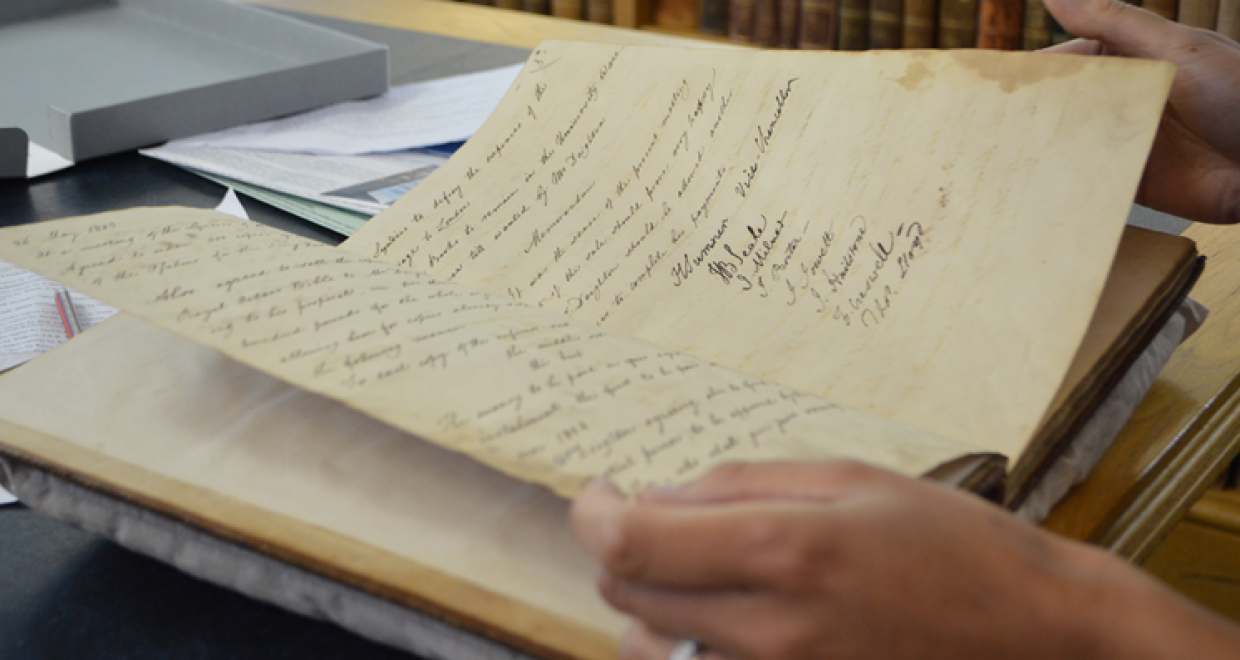Peer Review Through the Ages
During Peer Review Week, Juanita Goossens-Roach and Bridget McHugh looked at how peer review has changed over the years and throughout the ages, spending a fascinating morning at the University Library delving into hand-written correspondence from authors such as Victor Rothschild, A E Housman and Alan Turing.

The core purpose of peer review has not changed over the years: to provide important peer feedback on publications and publication proposals. However, the format of peer review reports has changed significantly, not just with the introduction of technology, but also with the more formal style and format of reports. The peer review reports of today are structured and tailored to each individual journal, book and publication. In contrast, the peer review reports of the early 20th century are open, sometimes light-hearted letters, which follow a format and style unique to the author.
As much as technology has helped to shape peer review today, there was something special about looking at such historical correspondence, as can be seen when examining the examples below:
Letter to the editor: Victor Rothschild, 1946
Victor Rothschild’s letter in 1946 seems to be the equivalent of a modern-day book proposal. In it, he summarises the reasons why his book Mathematics for Non-Mathematicians should be published. However these reasons bear little resemblance to those that you may find in a modern book proposal. Rothschild advocates publication because: ‘the book is not chatty and contains no references to buns, cricket pitches, postmen knocking twice.. Nor is there any Marxist or other political moral in it‘.


Allied Book Centre Appeal, 31st Oct. 1938: E. Ansell
This is a request for publication of first-hand correspondence from men during the war service, drawn from The War List of the University of Cambridge, 1914–1918. It includes the periods of service of the men, proving to be more comprehensive than the original list itself; with permission sought from the Syndics, Cambridge University Press and the current mayor at the time, Major Carey.

Goodstein’s Reflections on the Foundations of Mathematics: Peer reviewed by Alan Turing
Here, Alan Turing replies to a Press editor, outlining his reluctance to review Goodstein’s manuscript because he ‘has always felt a strong antipathy, difficult to dissociate from prejudice, to Goodstein’s work’.


From looking at later correspondence, it seems that the Press asked him to review the work nonetheless, and Turing confidently states that he ‘is quite convinced that it is not suitable for publication in book form’. Goodstein’s ideas are ‘not very coherently expressed’ and ‘where he does succeed in getting his ideas across, they turn out to be confused or superficial’.
Norman William (NW) McLachlan
McLachlan gives a light-hearted take on peer-review: asking for a status update on his manuscript submission, whether the reports are favourable, and explaining how he would really like to respond to referees!
The Tale of the Two Talents, 4th June 1919: peer-reviewed by Alfred Edward (AE) Housman
Poetic peer review of The Tale of the Two Talents by A.Bullock, peer-reviewed by AE Housman, giving a synopsis of the work and his thoughts on the writing style and how it might fit within publishing at the Press. Overall, Housman thought the book was very capable with ‘distinction and dignity‘ thus worthy of publication.


Isaac Newton: entry in the Syndicate Minutes
Newton’s famous Philosophiæ Naturalis Principia Mathematica, often referred simply as the Principia was first published on the 5th of July 1687. Here, we see the entry in the Syndicate minutes.








